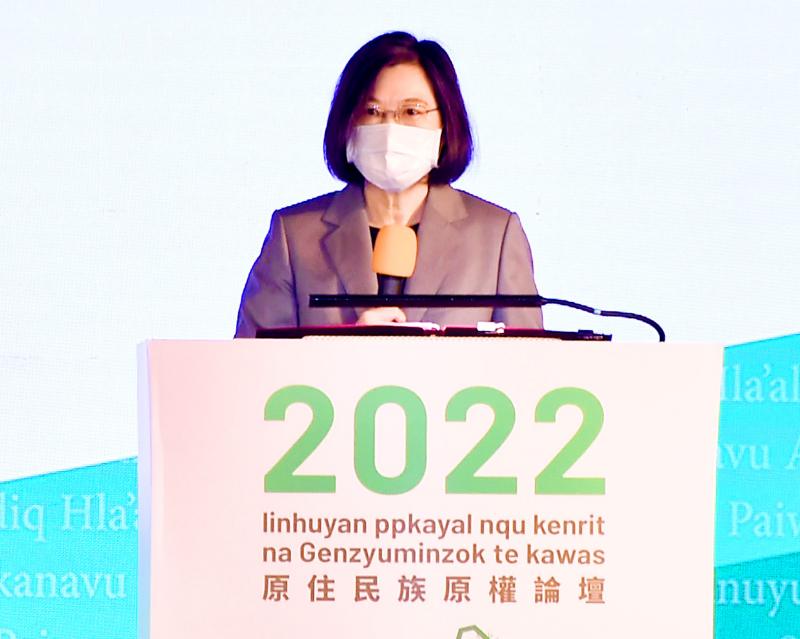President Tsai Ing-wen (蔡英文) yesterday pushed for improvement in indigenous people’s rights to align with global standards, and called on society to respect and learn more from indigenous peoples.
The president was speaking at the opening of this year’s Indigenous Rights Forum held to mark Indigenous Peoples’ Day.
Indigenous rights are deeply connected to the concept of human rights — from the ratification of the UN’s two covenants on human rights to the UN’s Declaration on the Rights of Indigenous Peoples and the Taiwanese government’s promulgation of the Indigenous Peoples Basic Act (原住民族基本法), Tsai said.

Photo: Tu Chien-jung, Taipei Times
“These steps to improve human rights also go toward endorsing and safeguarding the rights of indigenous peoples to their land, language, culture and their group identity,” Tsai told the forum, which was organized by the National Human Rights Commission and the Council of Indigenous Peoples.
She added that six years ago, the Presidential Office set up the Indigenous Historical Justice and Transitional Justice Committee, and two years ago, the Control Yuan launched the National Human Rights Commission to promote transitional justice for indigenous peoples.
Aside from implementing policies for indigenous peoples and protecting their rights, the government is working more to make them “more mainstream” in society, she said.
Resources and mechanisms are now in place to have government meetings hold simultaneous interpretations of indigenous languages, she said.
“The government supports indigenous peoples’ rights to promote their culture, and has established television and radio networks for indigenous peoples,” she said, adding that she has noticed that many young indigenous people are active on YouTube and Instagram, and many have podcasts.
“We wish to see that each year’s August 1 is not just for indigenous peoples, but for all people in Taiwan to mark this day,” she said.
“Our society should pay respect to and to learn from indigenous peoples,” she said.
Separately, Australian Representative to Taiwan Jenny Bloomfield also marked the occasion with a video post on the Facebook page of the Australian Office in Taipei on Sunday.
“Australia and Taiwan have worked even closer together over recent years to strengthen exchanges between our indigenous peoples and communities,” she said in the video.
In a statement yesterday, she said that “indigenous cultures, languages, histories and traditions are a vital part of who we are — and they form a special bond between Australia and Taiwan.”
“Today, we are proud to join with you as you celebrate the history, culture and achievements of Taiwan’s Indigenous peoples. We will continue to work together to promote opportunities for Indigenous peoples everywhere; to ensure that the rights and traditions of Indigenous peoples are respected; and that all Indigenous peoples are full participants and beneficiaries of a free, open and fairer world,” it said.

A preclearance service to facilitate entry for people traveling to select airports in Japan would be available from Thursday next week to Feb. 25 at Taiwan Taoyuan International Airport, Taoyuan International Airport Corp (TIAC) said on Tuesday. The service was first made available to Taiwanese travelers throughout the winter vacation of 2024 and during the Lunar New Year holiday. In addition to flights to the Japanese cities of Hakodate, Asahikawa, Akita, Sendai, Niigata, Okayama, Takamatsu, Kumamoto and Kagoshima, the service would be available to travelers to Kobe and Oita. The service can be accessed by passengers of 15 flight routes operated by

GIVE AND TAKE: Blood demand continues to rise each year, while fewer young donors are available due to the nation’s falling birthrate, a doctor said Blood donors can redeem points earned from donations to obtain limited edition Formosan black bear travel mugs, the Kaohsiung Blood Center said yesterday, as it announced a goal of stocking 20,000 units of blood prior to the Lunar New Year. The last month of the lunar year is National Blood Donation Month, when local centers seek to stockpile blood for use during the Lunar New Year holiday. The blood demand in southern Taiwan — including Tainan and Kaohsiung, as well as Chiayi, Pingtung, Penghu and Taitung counties — is about 2,000 units per day, the center said. The donation campaign aims to boost

ENHANCING EFFICIENCY: The apron can accommodate 16 airplanes overnight at Taoyuan airport while work on the third runway continues, the transport minister said A new temporary overnight parking apron at Taiwan Taoyuan International Airport is to start operating on Friday next week to boost operational efficiency while the third runway is being constructed, the Ministry of Transportation and Communications said yesterday. The apron — one of the crucial projects in the construction of the third runway — can accommodate 16 aircraft overnight at the nation’s largest international airport, Minister of Transportation and Communications Chen Shih-kai (陳世凱) told reporters while inspecting the new facility yesterday morning. Aside from providing the airport operator with greater flexibility in aircraft parking during the third runway construction,

American climber Alex Honnold is to attempt a free climb of Taipei 101 today at 9am, with traffic closures around the skyscraper. To accommodate the climb attempt and filming, the Taipei Department of Transportation said traffic controls would be enforced around the Taipei 101 area. If weather conditions delay the climb, the restrictions would be pushed back to tomorrow. Traffic controls would be in place today from 7am to 11am around the Taipei 101 area, the department said. Songzhi Road would be fully closed in both directions between Songlian Road and Xinyi Road Sec 5, it said, adding that bidirectional traffic controls would